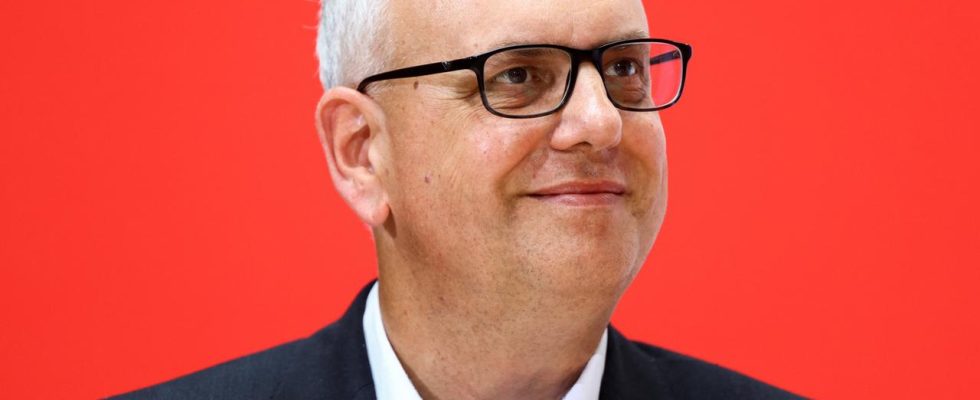faq
After their election victory, Bremen’s SPD has already sounded out with the Left and Greens. Discussions with the CDU will follow today, and the Social Democrats want to make a decision by Wednesday. Which alliance is more likely?
the initial situation
Bremen’s Social Democrats see themselves in a comfortable situation after their election victory on Sunday: It is up to them whether they want to continue the red-green-red alliance or give in to the CDU’s campaign for a grand coalition. The Social Democrats officially started their exploratory talks yesterday. They want to announce who they will be working with by Wednesday at the latest.
Those involved in the SPD and the Greens spoke of “constructive talks” on Friday. Apart from that, confidentiality was agreed. In the evening, the Social Democrats held talks with the Left Party. Today they want to negotiate with the CDU. Which alliance the SPD will ultimately choose depends on various factors.
What speaks for a new red-green-red coalition?
According to an Infratest dimap survey from election day, the SPD supporters are not exactly ardent supporters of the red-green-red coalition – only 54 percent see it as a good alliance. However, they would prefer red-green-red to a grand coalition. Only 35 percent of SPD supporters thought the GroKo was a good solution. One can assume that the base of the party sees it similarly to its supporters – and that the majority would prefer red-green-red to GroKo.
Bremen’s Mayor Andreas Bovenschulte also repeatedly emphasized before and after the election what a good job his red-green-red alliance had done in Bremen over the past four years. Now he could even continue the coalition stronger, probably even with five out of nine instead of – as before – with four out of nine SPD senators.
The positions of the SPD in social, educational and economic policy are more similar to those of the Greens and Left than those of the CDU. Current example: the training fund that the Senate has just launched. As a result, companies must pay into a fund. Only those who train are financially supported from the pot – a red-green-red joint project. The CDU is strictly against it.
Why could the SPD opt for a GroKo?
The famous “Keep it up” is unpopular, especially in Bremen. The two-city country is notoriously cash-strapped and repeatedly makes the headlines because of its high poverty rate and poor results in comparative school tests. The SPD could probably sell its supporters a spirit of optimism better in a new alliance than in the old one.
In addition, over the past four years, Red-Green-Red has not always worked together as smoothly as the alliance partners like to make it out to be. Greens and leftists in particular often quarrelled, in particular the green mobility senator Maike Schaefer and the left-wing economics senator Kristina Vogt.
Schaefer has announced her resignation as a result of her severe election defeat. Unaffected by this, the SPD could possibly govern more easily in a two-party alliance with the CDU than in a three-party alliance with the Greens and the Left. At least if the Social Democrats manage to eliminate the biggest trouble spots in the course of the coalition negotiations.
What speaks in terms of content for a grand coalition?
It’s true what Bremen’s CDU leader Carsten Meyer-Heder says: there are major overlaps between the SPD and CDU when it comes to questions of internal security and transport policy. Unlike the Greens, for example, both want to tolerate parking on sidewalks – a major controversial issue in Bremen – at least temporarily, if there is enough space for prams and wheelchair users.
The picture for internal security is similar: both parties want to increase the number of police officers. Both want to fight cybercrime with a special unit. Both are relying on more security and police presence at hotspots such as Bremen Central Station. Bremen’s SPD interior senator Ulrich Mäurer, who will probably continue to hold this position, could probably realize his plans for internal security more easily in a coalition with the CDU than with the Greens and the Left Party. This applies, for example, to video surveillance in public spaces and the use of tasers. Mäurer would like to expand both in Bremen. But the Greens, and even more so the Left, have reservations about it.
Does everything in Bremen only depend on the SPD?
In principle yes. All parties in the citizenship rule out cooperation with the right-wing conservative Citizens in Anger (BIW). The FDP and CDU also do not want to work with the Left Party. There is no majority for a Jamaica alliance of CDU, FDP and Greens. Therefore, only red-green-red or the GroKo come into question. So there is no way around the SPD.
Nevertheless, the Social Democrats must not go too far in the exploratory talks. For example, the Green Senator for Social Affairs, Anja Stahmann, has already made it clear that her party will by no means remain in power under all circumstances.
The CDU will not let the SPD dictate the conditions for a grand coalition arbitrarily. Bremen’s Christian Democrats have had to learn in recent years how to be patient in the opposition.

